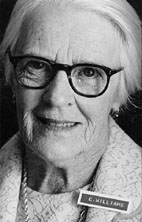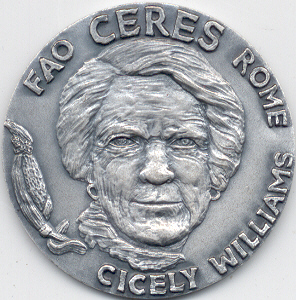Cicely Williams
Cicely Delphine Williams (2 December 1893 – 13 July 1992) was a pioneering Jamaican physician and pediatrician who is best known for her work in the field of malnutrition and for identifying and describing the disease kwashiorkor. Her contributions to public health and child welfare have had a lasting impact on the medical community and the lives of countless children worldwide.
Early Life and Education[edit | edit source]
Cicely Williams was born in Kew Park, Westmoreland Parish, Jamaica. She was the daughter of a plantation owner and grew up in a privileged environment. Williams attended Cheltenham Ladies' College in England and later studied medicine at Somerville College, Oxford, where she graduated in 1923.
Medical Career[edit | edit source]
After completing her medical degree, Williams joined the Colonial Medical Service and was posted to the Gold Coast (now Ghana). It was here that she first encountered cases of severe malnutrition among children, which led her to identify and describe kwashiorkor, a form of severe protein-energy malnutrition.
Kwashiorkor[edit | edit source]
In 1933, Williams published her findings on kwashiorkor, highlighting the disease's symptoms, which include edema, anemia, and dermatosis. Her work brought international attention to the condition and emphasized the importance of adequate protein intake in children's diets.
Later Work[edit | edit source]
Williams continued her work in various countries, including Malaya (now Malaysia), where she focused on maternal and child health. She was instrumental in establishing health programs and clinics that addressed malnutrition and other health issues affecting women and children.
Legacy[edit | edit source]
Cicely Williams' contributions to pediatrics and public health have had a profound impact on the field. Her work on kwashiorkor has saved countless lives and has led to a better understanding of the importance of nutrition in child development. Williams received numerous awards and honors for her work, including the Order of the British Empire (OBE) and the Lasker Award.
See Also[edit | edit source]
References[edit | edit source]
External Links[edit | edit source]
Search WikiMD
Ad.Tired of being Overweight? Try W8MD's physician weight loss program.
Semaglutide (Ozempic / Wegovy and Tirzepatide (Mounjaro / Zepbound) available.
Advertise on WikiMD
|
WikiMD's Wellness Encyclopedia |
| Let Food Be Thy Medicine Medicine Thy Food - Hippocrates |
Translate this page: - East Asian
中文,
日本,
한국어,
South Asian
हिन्दी,
தமிழ்,
తెలుగు,
Urdu,
ಕನ್ನಡ,
Southeast Asian
Indonesian,
Vietnamese,
Thai,
မြန်မာဘာသာ,
বাংলা
European
español,
Deutsch,
français,
Greek,
português do Brasil,
polski,
română,
русский,
Nederlands,
norsk,
svenska,
suomi,
Italian
Middle Eastern & African
عربى,
Turkish,
Persian,
Hebrew,
Afrikaans,
isiZulu,
Kiswahili,
Other
Bulgarian,
Hungarian,
Czech,
Swedish,
മലയാളം,
मराठी,
ਪੰਜਾਬੀ,
ગુજરાતી,
Portuguese,
Ukrainian
Medical Disclaimer: WikiMD is not a substitute for professional medical advice. The information on WikiMD is provided as an information resource only, may be incorrect, outdated or misleading, and is not to be used or relied on for any diagnostic or treatment purposes. Please consult your health care provider before making any healthcare decisions or for guidance about a specific medical condition. WikiMD expressly disclaims responsibility, and shall have no liability, for any damages, loss, injury, or liability whatsoever suffered as a result of your reliance on the information contained in this site. By visiting this site you agree to the foregoing terms and conditions, which may from time to time be changed or supplemented by WikiMD. If you do not agree to the foregoing terms and conditions, you should not enter or use this site. See full disclaimer.
Credits:Most images are courtesy of Wikimedia commons, and templates, categories Wikipedia, licensed under CC BY SA or similar.
Contributors: Prab R. Tumpati, MD


